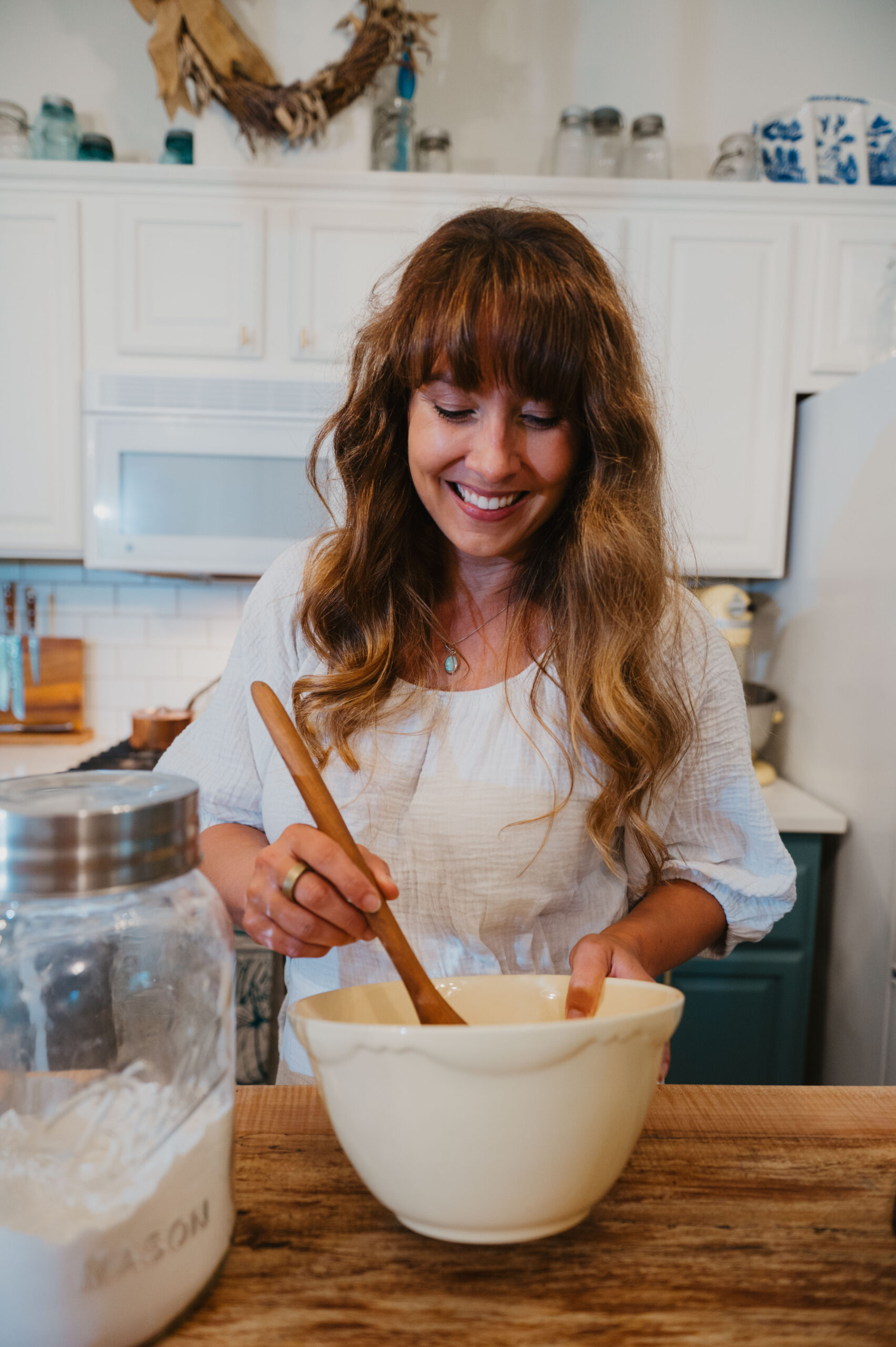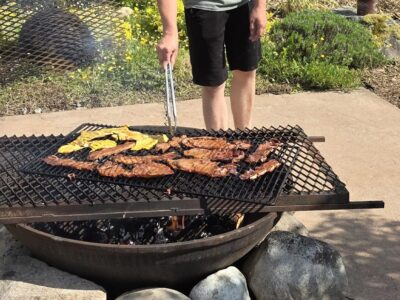These time-saving tips when cooking from scratch are what I use to keep our kitchen free from as much processed food as possible, without being chained to the stove or feeling like all I do is cook.
If you need help getting real food on the table without a ton of extra time, then you, my friend, are in the right place.
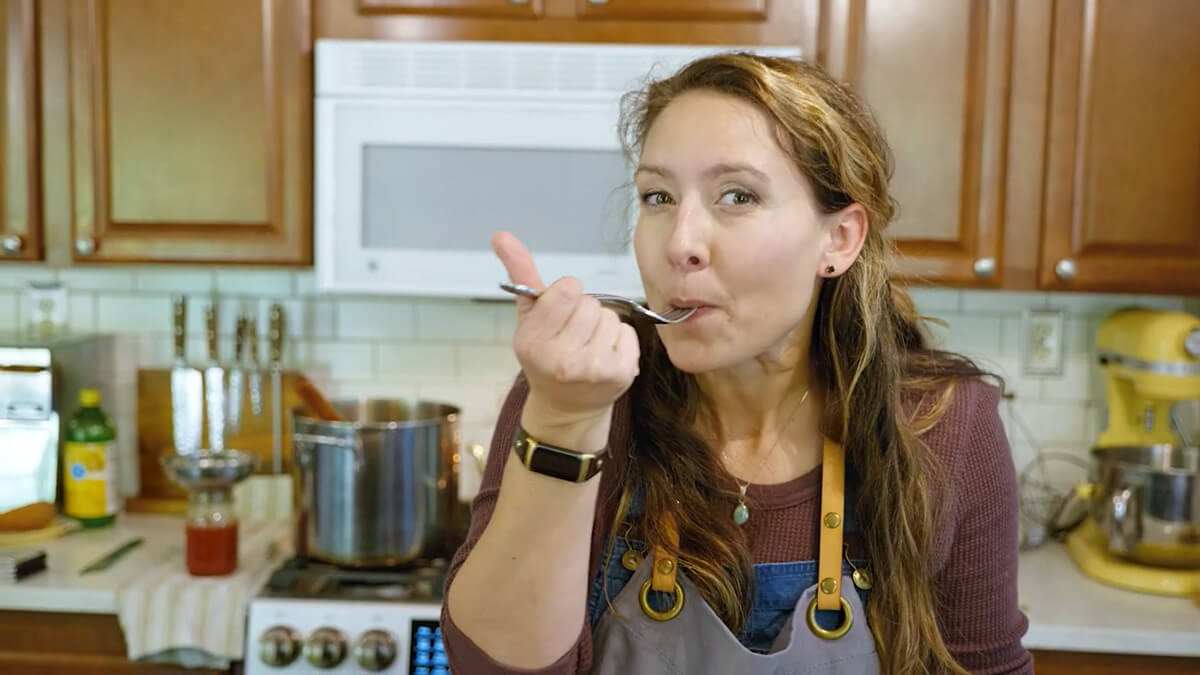
How Do You Make Everything From Scratch?
Over the years, I’ve often been asked, “How do you make everything from scratch? I just don’t have the time for home-cooked foods.” In fact, I’ve been asked that so many times that I’ve dedicated multiple episodes on the Pioneering Today Podcast to this topic!
This blog post has been updated to incorporate my best tips, all organized in one place. You can listen to the full episodes of all podcast recordings below, including my most recent interview with RuthAnn Zimmerman.
RuthAnn grew up as an old-order Mennonite, which is very similar to the Amish. She didn’t have a car, radio, or TV, and was more or less self-sufficient. They did, however, have electricity and a telephone, but that was about the extent of their electronic use.
She’s learned a lot about cooking from scratch from her upbringing, and in this newest podcast episode (Pioneering Today Podcast episode #465), she’s sharing those tips.
Why You Should Start Cooking From Scratch
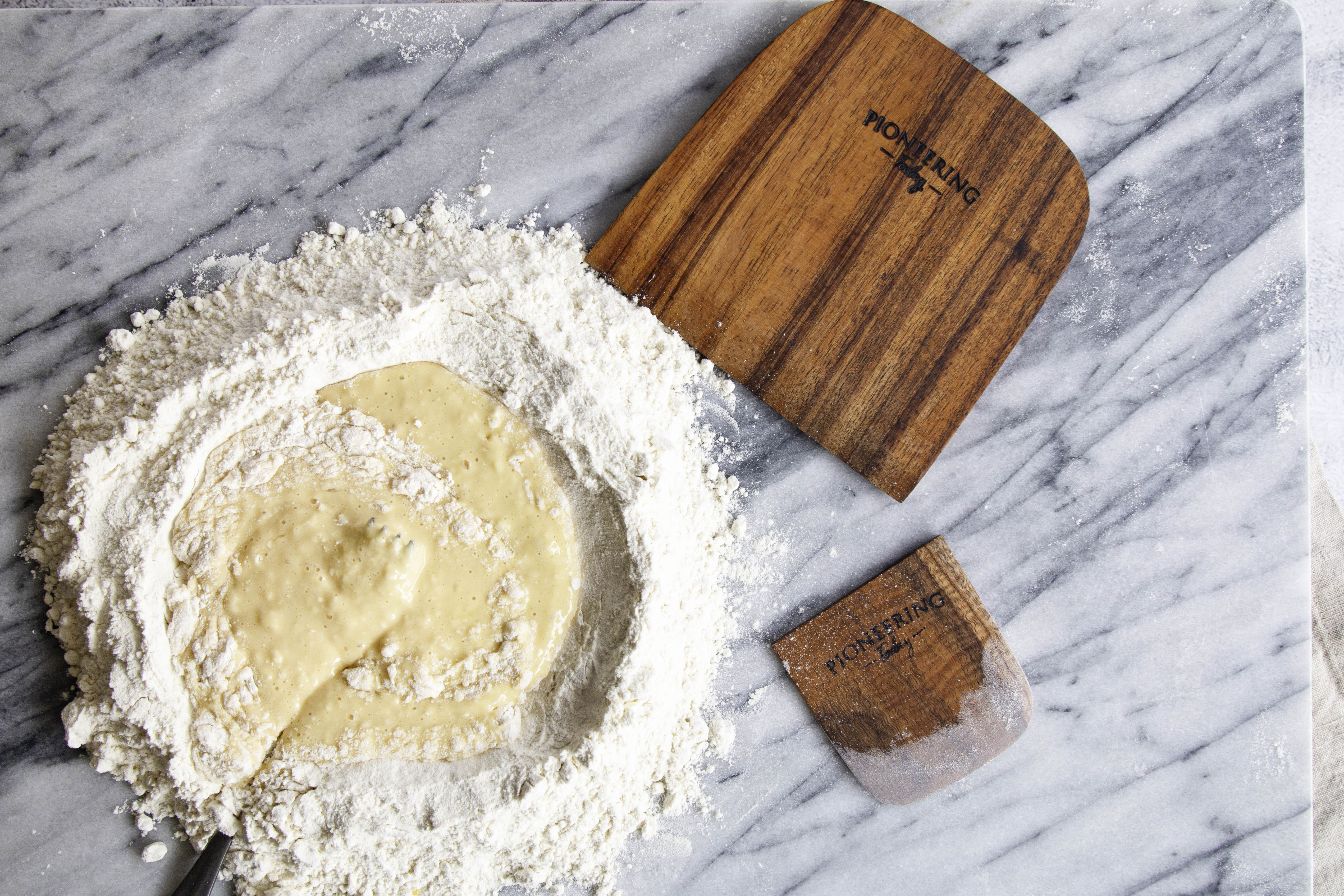
If you feel like you don’t have the time to start cooking from scratch, you aren’t alone. The truth is, for many years I didn’t have the time either, or at least I didn’t think I did.
But I also knew I wanted to swap out better foods for my family because of my health issues. So, I was left with a dilemma: spend less time in the kitchen and sacrifice my health, or figure out how to make meal planning and home cooking fit into my already busy schedule.
Cooking from scratch and using traditional cooking methods does take more time than purchasing processed boxed meals or fast food. There’s no way around it. It’s going to take more time. However, it doesn’t take a lot more time. Where there’s a will, there’s a way! If you’re ready to improve your health, save money at the grocery store, and enjoy food that simply tastes better, then let’s get started!
What Is Cooking From Scratch
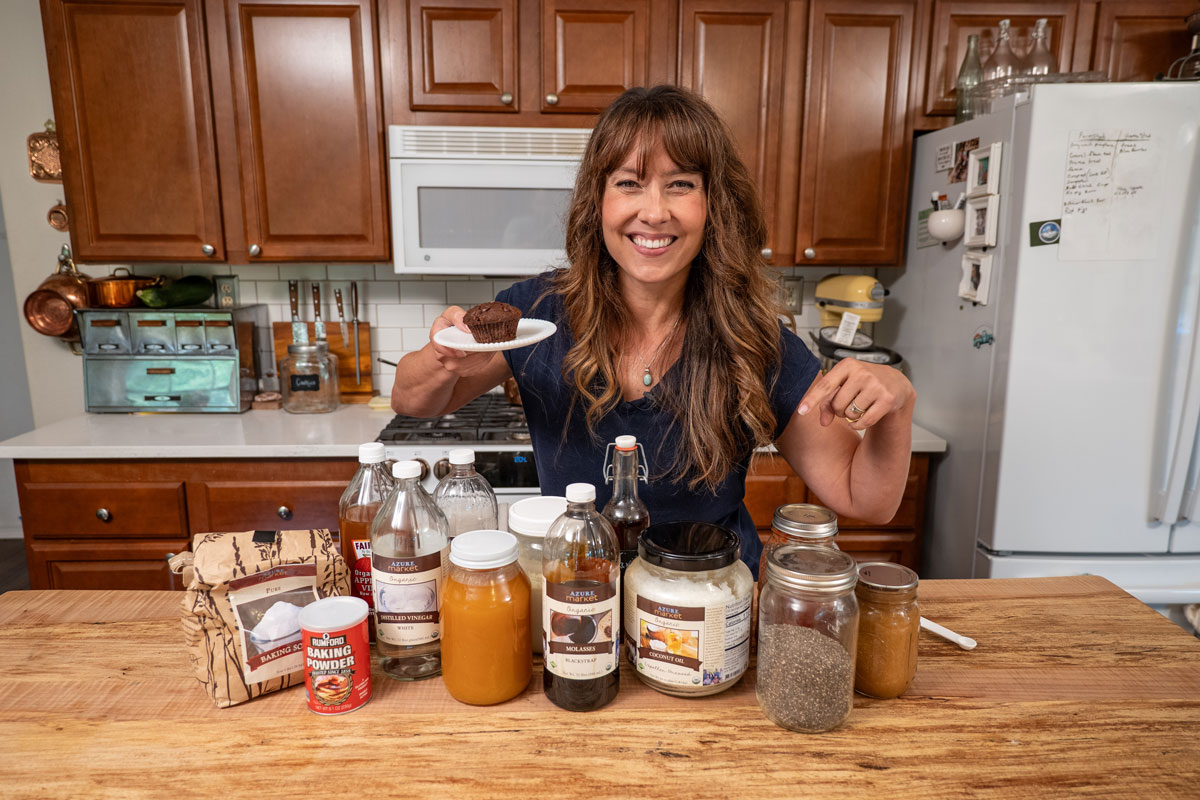
Cooking from scratch draws from our pioneer roots when processed ingredients and packaged foods weren’t available. It involves basic ingredients like fresh produce, raw meats, whole grains, etc., in minimally processed forms to create more nutritious (and more flavorful) meals.
If this approach feels overwhelming, don’t give up before you try. Cooking from scratch does not need to be an all-or-nothing concept. You can begin by choosing one meal of the day, one dish of the meal, or even one ingredient of a dish to make completely from scratch.
As you become more efficient and comfortable in your skills, you can layer in more challenges. Before you know it, you will be cooking more from-scratch foods than you thought was possible!
Top Tips for Cooking From Scratch
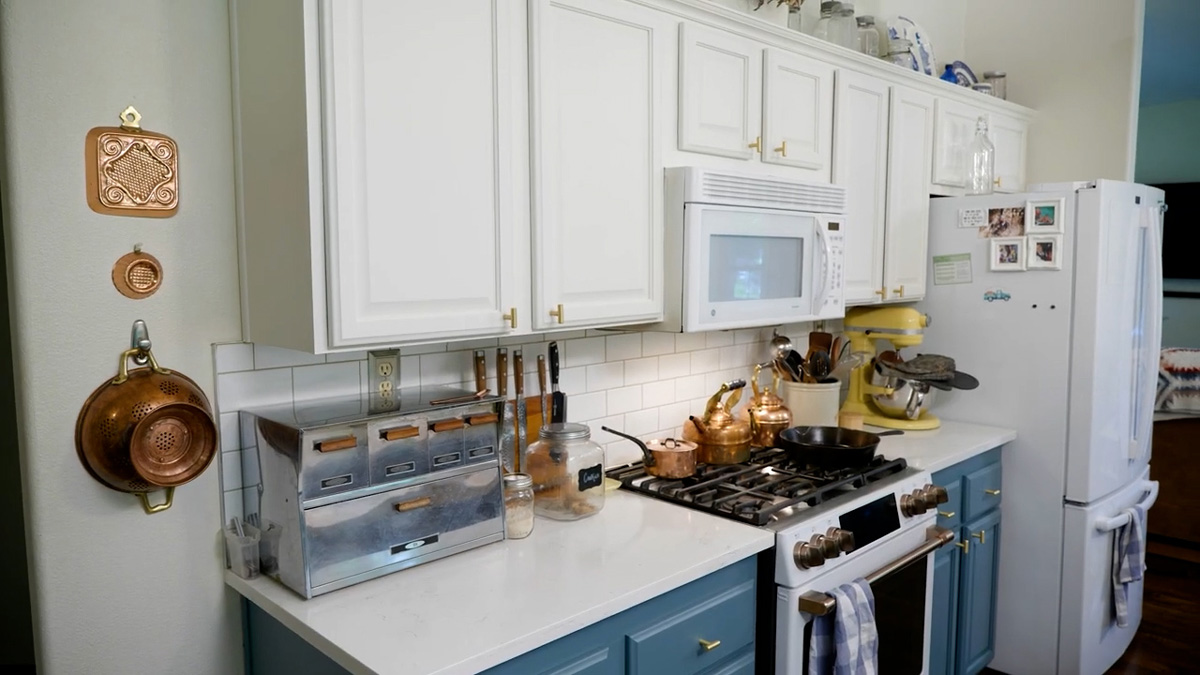
The good news about cooking from scratch is that there are time-saving hacks that make this approach so much more realistic. These tips have helped me transition to from-scratch cooking with much more ease, allowing room to actually enjoy my time in the kitchen.
Have a Well-Stocked Pantry
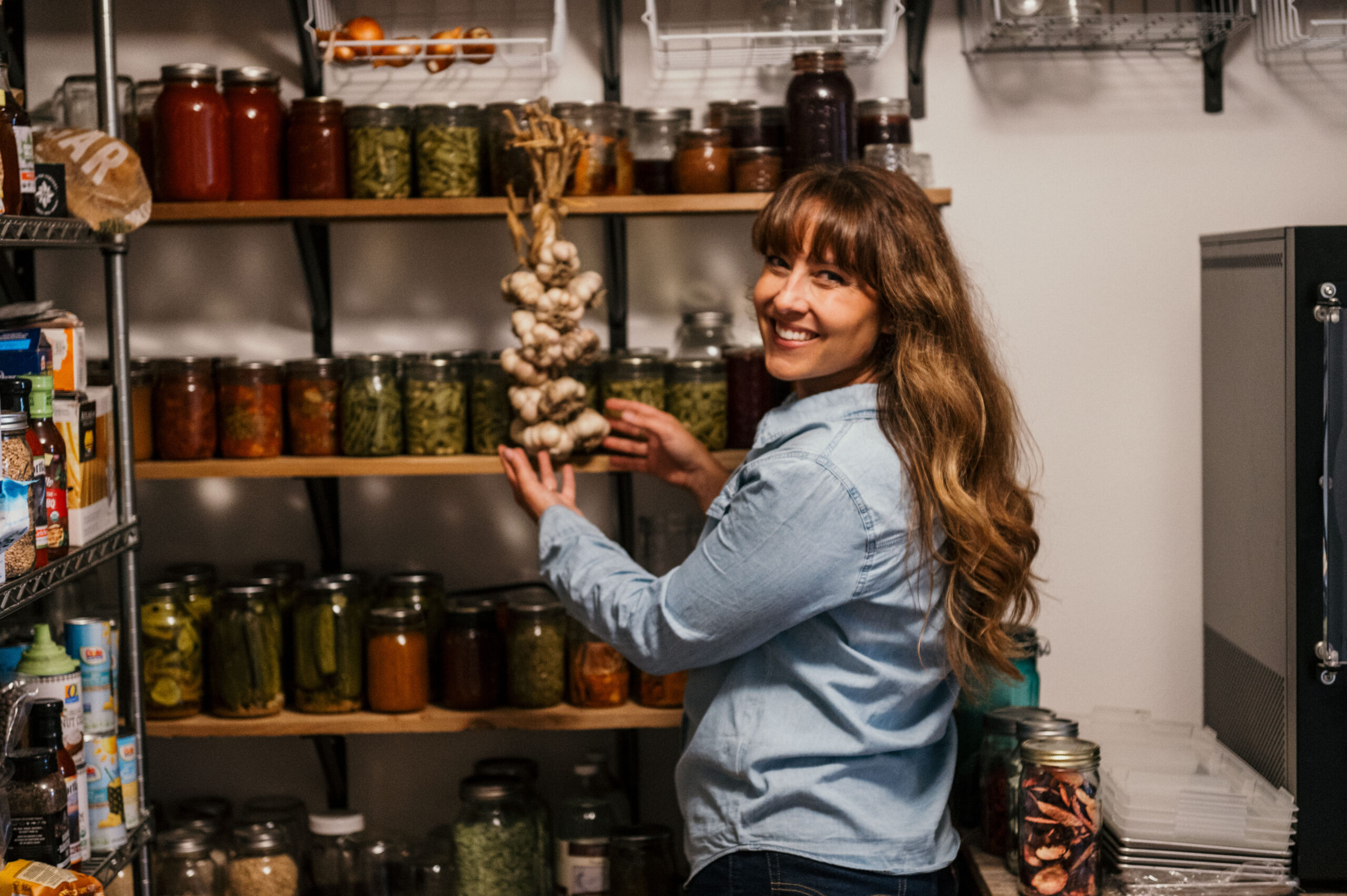
You can’t make food from scratch if you don’t have the ingredients. If you learn how to keep a well-stocked pantry, you will save time and money from running to the grocery store for one item (which always turns into more).
Furthermore, I love RuthAnn’s tip on how she sources her food. If the ingredient is for nutrition (such as her mayonnaise for deviled eggs and sandwiches), she’ll make it from scratch so that it’s as healthy as possible.
However, she doesn’t really worry about where she’s sourcing her sugar, because if she’s using sugar, it’s only in a homemade treat, which isn’t meant for nutrition.
- Set Minimums for Restock – Do not wait until you’re out to restock a food item. For example, I keep two tubs of coconut oil in the pantry and an open one in the kitchen, so I know that when I’m down to one tub in the pantry, it’s time to restock.
- Keep a Variety of Spices – A variety of seasonings and sauces can create several variations of one basic dish, such as roasts, chicken, eggs, casseroles, soups, beans, fried rice, etc.
- Make Pantry Mixes – I love DIY mixes in jars. Not just for homemade Christmas gifts but also to stock my own pantry with homemade versions of these convenience items for bread, pancakes, biscuits, muffins, hot cocoa, spice seasonings, and more!
Both RuthAnn and I believe that if you know how to make basic items from scratch, you can build a variety of meals from those basics.
Learn to Substitute
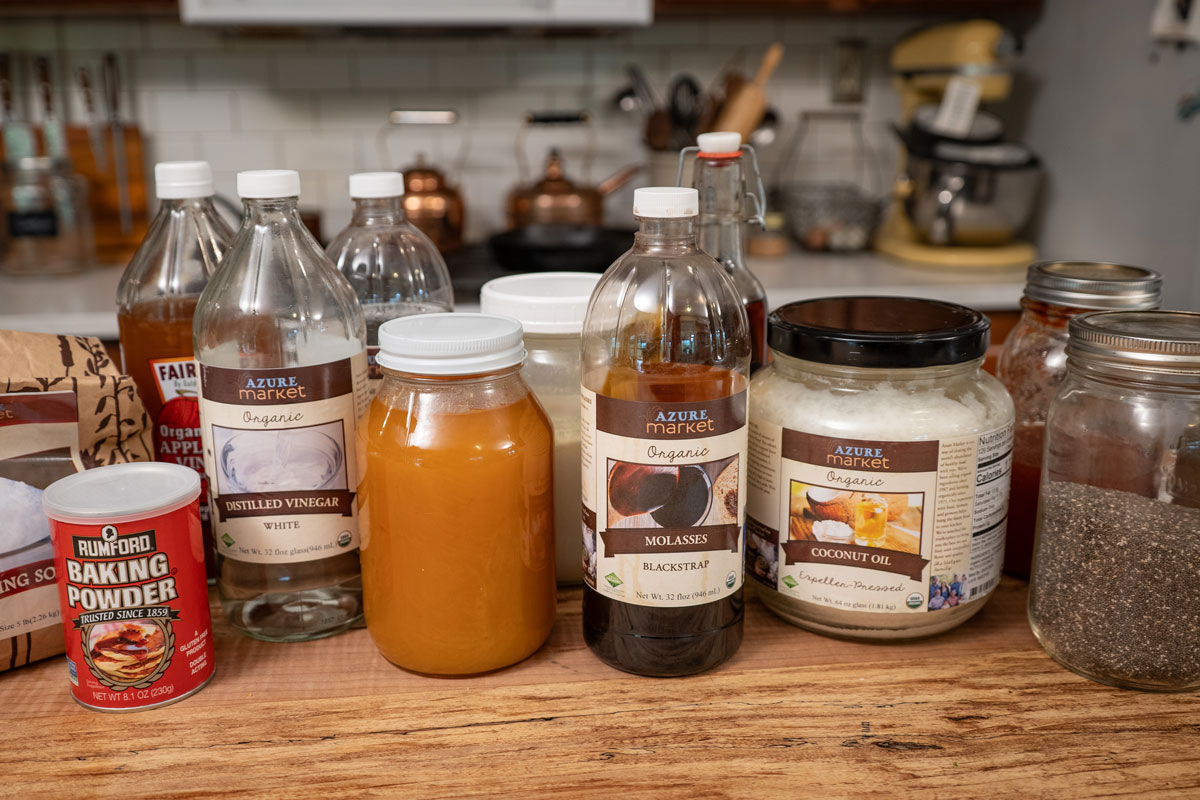
For me, the closest store is 10 miles away (20 miles round-trip), and I’m not going to drop everything to go get one ingredient. If you keep the basics on hand, you can use substitutes for a lot of foods.
For example, most recipes call for some kind of fat. I know I can substitute melted coconut oil, butter, avocado oil, olive oil, or even applesauce or pureed pumpkin in place of a specific fat (depending on the recipe).
Pro-Tip: For more genius substitution ideas, check out my post on ingredient substitutions everyone should know.
Double or Triple Recipes & Freeze
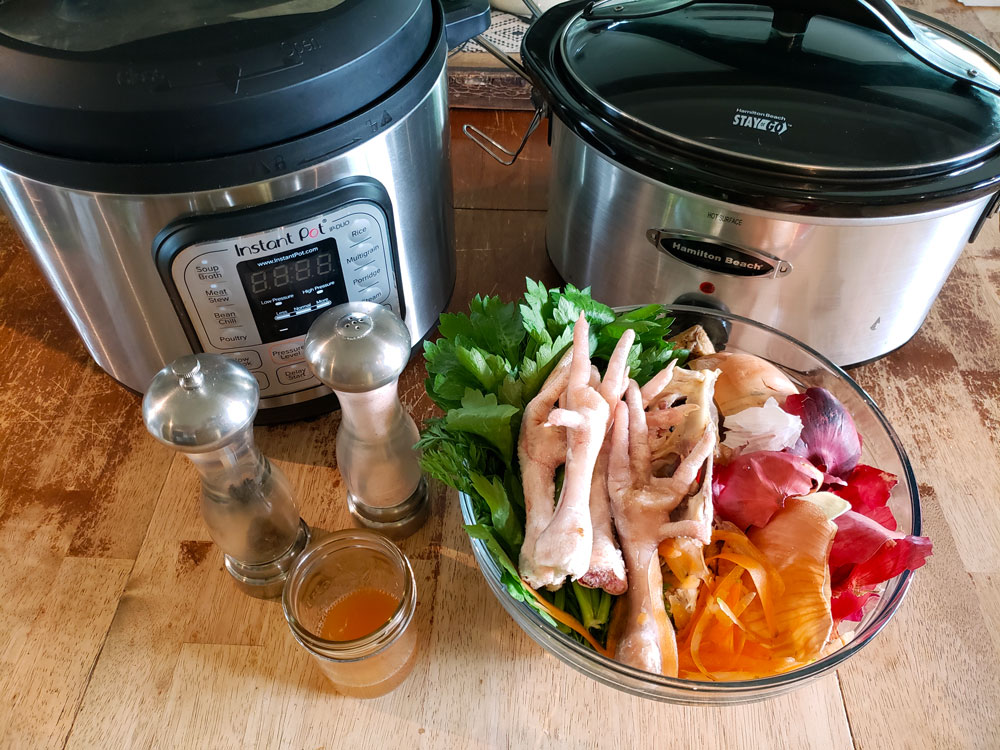
Making a double or triple batch of something you’re already making usually takes very little extra time. I’ve used this strategy a lot. It can be as simple as casually doubling a recipe or setting an entire day aside to prep a month’s worth of cooked meals for the freezer.
Read more about batch cooking here to determine the best strategy for your lifestyle.
Compile a Basic List of Meals
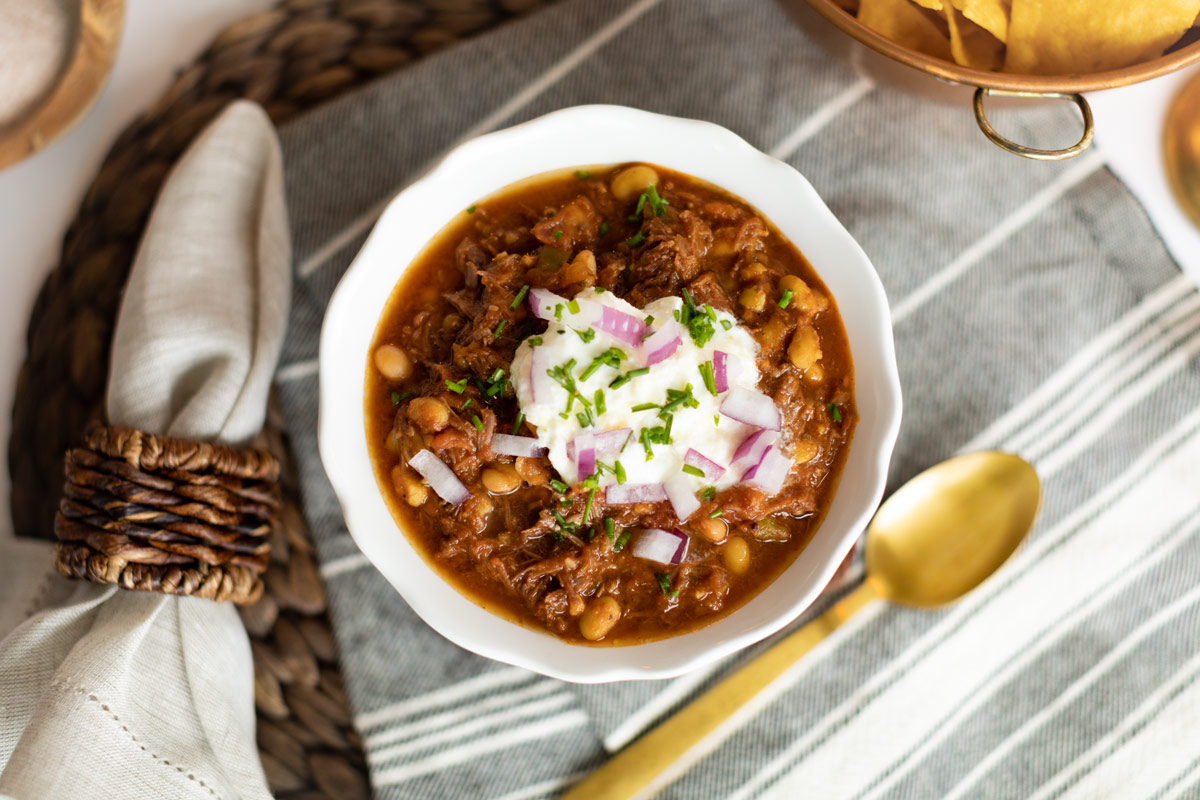
At the beginning of the week, I decide what I’ll be making based on what I have in stock or what is ready in the garden. These meals are usually choices I know my family enjoys already. I don’t like trying out a ton of new recipes when starting a meal plan because I want to be sure my family will enjoy what I’m cooking.
I plan to do the majority of our cooking on the days I’m home with less going on. When I worked outside the home, this meant I prepared a large meal on Sunday and Tuesday. Then, Thursday was generally a slow-cooked meal for supper.
This has changed since I started working from home, but I do like to consider our week and plan around any activities, Bible studies, or sports we may have going on. A lot of people don’t have the time to prep freezer meals for the whole week, so here are some tips to fill those gaps.
- 30-Minute Meals – Find a couple of simple yet delicious meals that you can pull together pretty quickly with ingredients you always have on hand, like tacos or bean bowls, spaghetti, stir-fries, omelets, and fried rice.
- Freeze Cooked Proteins – If you don’t have time to make full freezer meals, freeze cooked proteins like ground beef, shredded chicken and pork, or beef roast to pull out of the freezer and make a quick pot pie, casserole, enchiladas, or soup.
- Master Dough – Depending on your bread-making skills, you can make a master dough as simple as no-knead dough or a full-on sourdough. The dough will keep in the refrigerator all week to pull out and make into a variety of breads such as dinner rolls, sweet rolls, pizza crusts, and more! Pro-Tip: Don’t have a master dough but still need bread for dinner in less than 30 minutes? Check out my quick dinner roll recipe!
- Make One-Dish Meals – Dump-and-go meals in the Crock Pot, and these one-dish cast iron skillet or Dutch oven meals save a lot of time (and dishes) throughout the week.
Invest in Tools
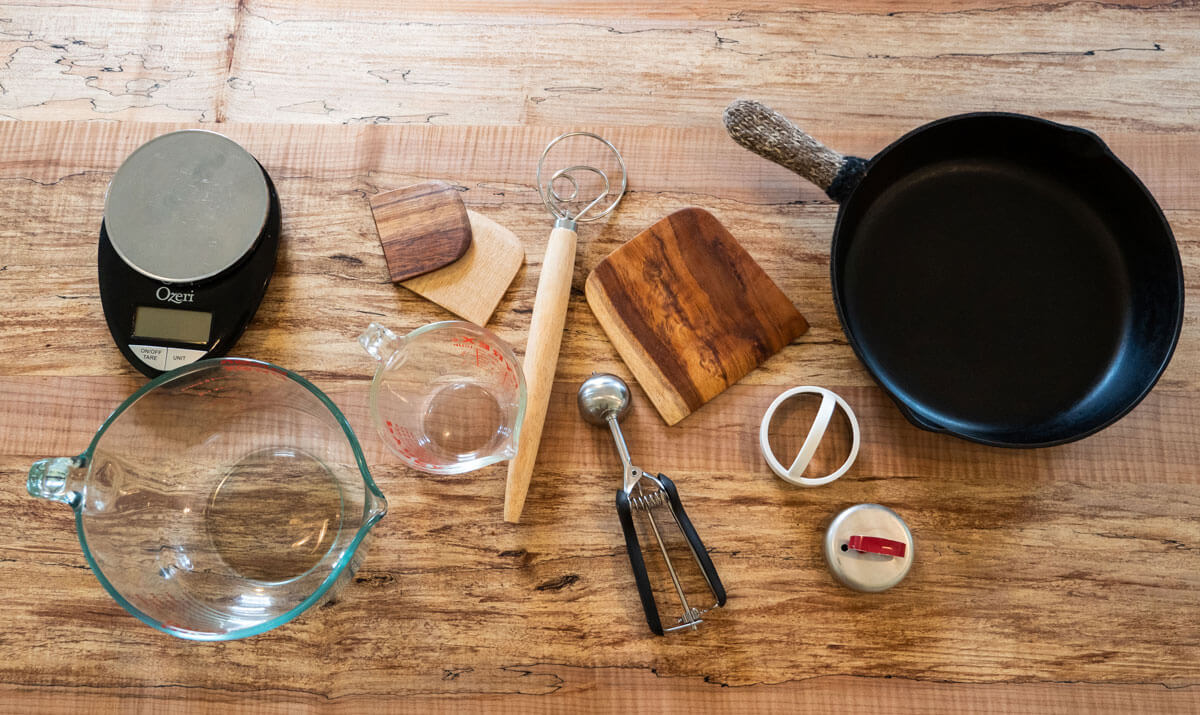
Remember that cooking from scratch means using ingredients as they were before modern processing, NOT preparing them as you would before modern conveniences. You do not have to limit yourself to the historical kitchen tools still used today.
Take advantage of modern technology to use an Instant Pot, electric grain mill, stand mixer, etc., in your kitchen.
While I love the therapeutic effect of kneading dough by hand, if you want to use a bread machine to make sure your home is stocked with homemade bread, there’s no judgment here!
Furthermore, if I want to make homemade mayonnaise, I’m probably not going to stand there and whisk the egg yolks with the oil until they emulsify; instead, I’ll grab my stick blender and blend it in about 30 seconds.
While I say all of this, RuthAnn points out that sometimes gadgets can hold us back. We don’t always have to pull out the food processor to perfectly slice, chop, or dice something. It’s completely acceptable to just do the work by hand (and sometimes faster when you consider getting the tool out, washing/drying, and putting it back away).
Pro-Tip: Looking for more ways to make your kitchen more efficient? Check out my list of must-have kitchen items for easier from-scratch cooking.
Meal Plan
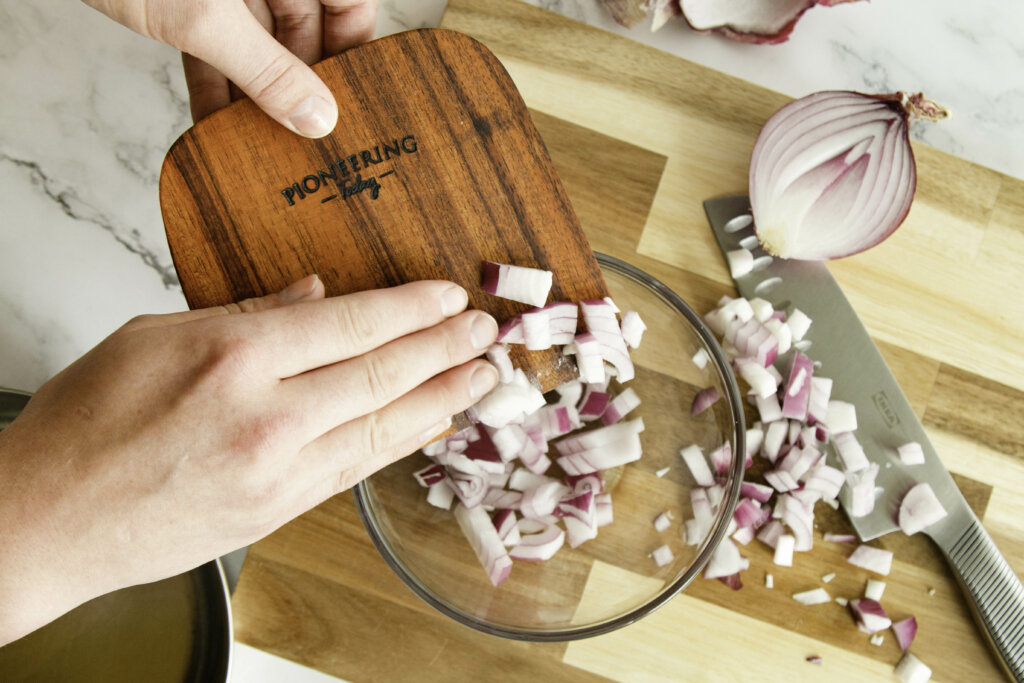
Meal planning is such an individual topic and what works best for me, may not work best for you. I believe meal planning helps you see the meals that will use the same ingredients and incorporate batch prep where possible.
I typically plan our meals around one main ingredient. This usually means planning meals around cuts of meat we have put up in our freezer and pantry. You can easily create a meal by starting with a main ingredient like meat and adding some vegetables and a starch.
Whenever I make dinner, it’s almost guaranteed that I’ll be using some diced onions, minced garlic, diced celery, and/or carrots. Because of this, I know that at the beginning of the week, I can chop up extra of these items and toss them in the refrigerator, and they’re ready to go when I need them.
Yes, this will take a little bit of extra time upfront, but then you’re only washing the cutting board and knife once, you’re only getting these ingredients out once, and all those extra minutes add up.
If you have older children that you want to cook for themselves, RuthAnn has a list of meals that she puts up on the refrigerator. Her children can then go look at the list and know they’ll have all the ingredients needed to whip up a sandwich, or make some soup, etc. This also teaches your children to start thinking about planning ahead and cooking from scratch.
Some people may find it helpful to plan out just one week at a time (or even two to three days at a time). Sitting down as a family and listing out all the activities for the week can help you determine how many meals need to be cooked, who will be home to eat them, and what time they should be ready (for example, eating dinner earlier on Wednesday to make it to church).
Make Your Own Convenience Meals
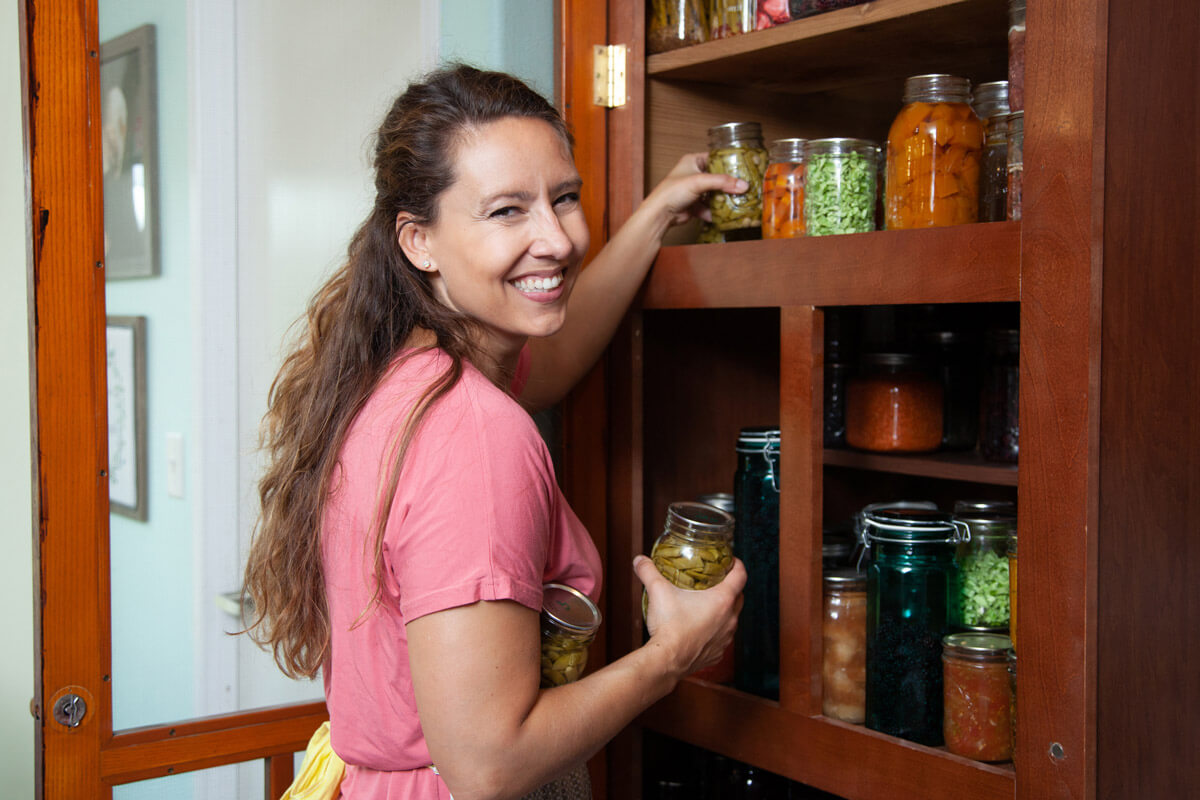
There are some nights when I know I can’t make the entire meal from scratch, but if I have things already made at home, then I don’t need to buy them from the store.
Having items like canned bone broth, canned chicken, and frozen, freeze-dried, or canned vegetables means I can throw together a quick, easy and healthy soup in minutes.
Because all this work is done prior to cooking, meals come together quickly but still contain wholesome, from-scratch goodness.
Eat Leftovers
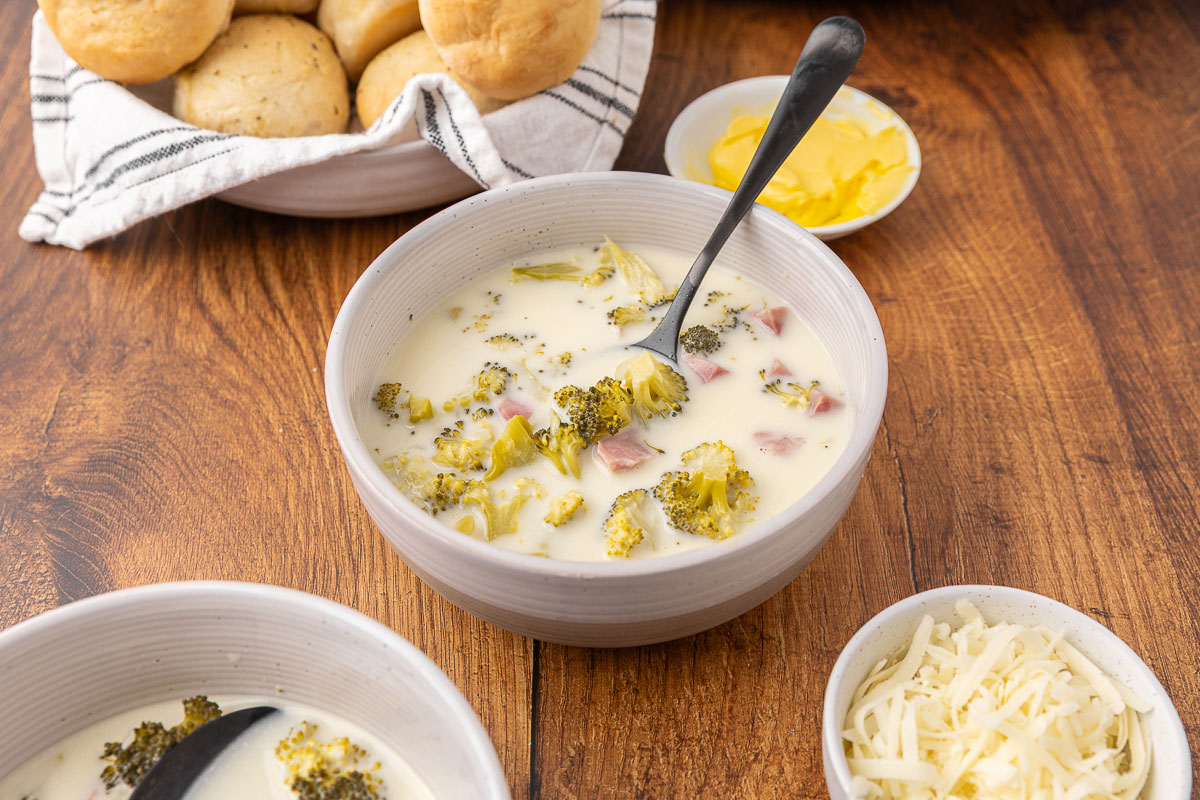
This goes along with making a double or triple batch. One thing I like to do is to make enough at dinner time to have leftovers for lunch the next day.
Depending on how many people take leftovers for lunch, this may not even mean making an entire double-batch.
Another great tip is to have one meal per week that’s a “leftover meal” and everyone grabs odds and ends that are in the refrigerator that need to be eaten before they go bad.
Cook On Your Days Off
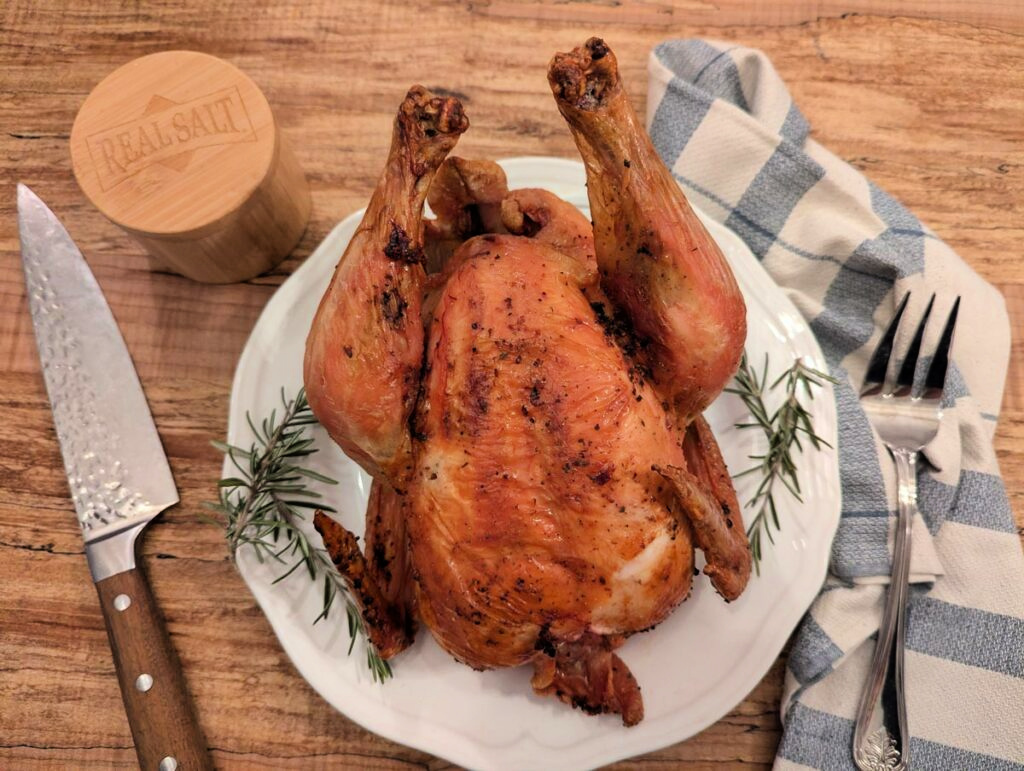
I like to cook a large piece of meat, such as a whole chicken (or turkey), roast, or ham on my days off, then use up the meat throughout the week in various recipes.
Save the bones (if any) from the meat and make your own bone broth. I love using kitchen scraps to make things that are good and useful for my family instead of throwing them out.
Don’t Forget From-Scratch Snacks
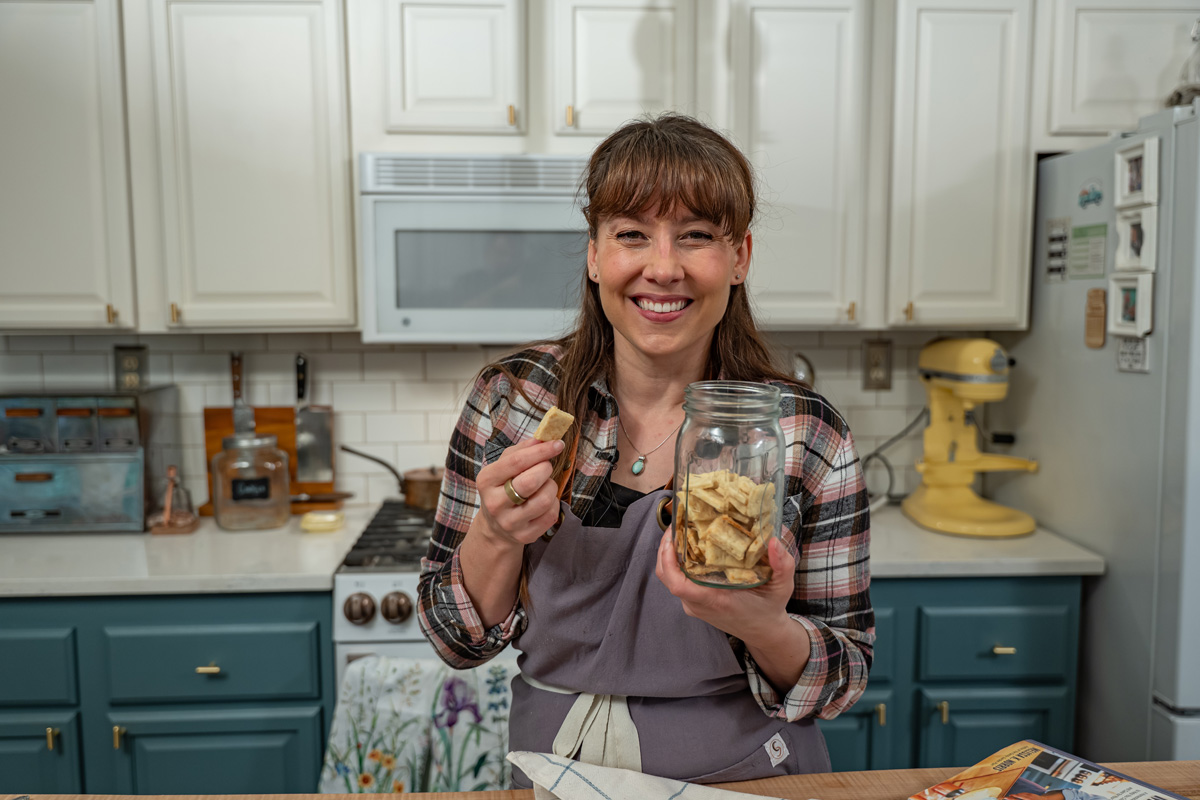
When it comes to processed foods, swapping out homemade snacks can make a huge impact on your efforts to increase cooking from scratch. Ditch the expensive chips, crackers, trail mixes, cookies, candy, etc. and try these ideas instead.
- Cheese and Pickled Veggies – Combine cheese slices with dill pickles or pickled asparagus. The creamy cheese makes a delicious balance to the tang of the pickling.
- Veggies and Dip – If you have veggies already washed and prepped sitting in the fridge, you are more likely to reach for them, especially when you have homemade buttermilk ranch for dipping!
- Granola Bars – Did you know you can make homemade granola bars? This recipe can be customized to a variety of different flavors, and they’re even gluten-free!
- Deviled Eggs – During certain times of the year, our hens provide us with plenty of eggs. My family loves it when I have deviled eggs in the fridge for a quick grab-and-go snack packed with protein.
- Muffins – Muffins make a great portable snack, and keeping homemade muffin mix in your pantry makes whipping up a batch of muffins so fast.
- Salty Swaps – If you have a hard time breaking your chip habit, try making stovetop popcorn, homemade crackers (or this cheese cracker variation), and kale chips. These all come together in a matter of minutes and provide that satisfying salty crunch.
- Sweet Swaps – If you are better described with a sweet tooth, try popcorn balls, dried fruit and nut candy, dehydrated fruit, brownies, or cookies.
More Cooking From Scratch Inspiration

Need more cooking-from-scratch inspiration or tips on growing, cooking, and preserving your own food? Check out my books, The Made From Scratch Life and Home and Hand Made, or click here to sign up for the notification list for when the Pioneering Today Academy opens!
About RuthAnn
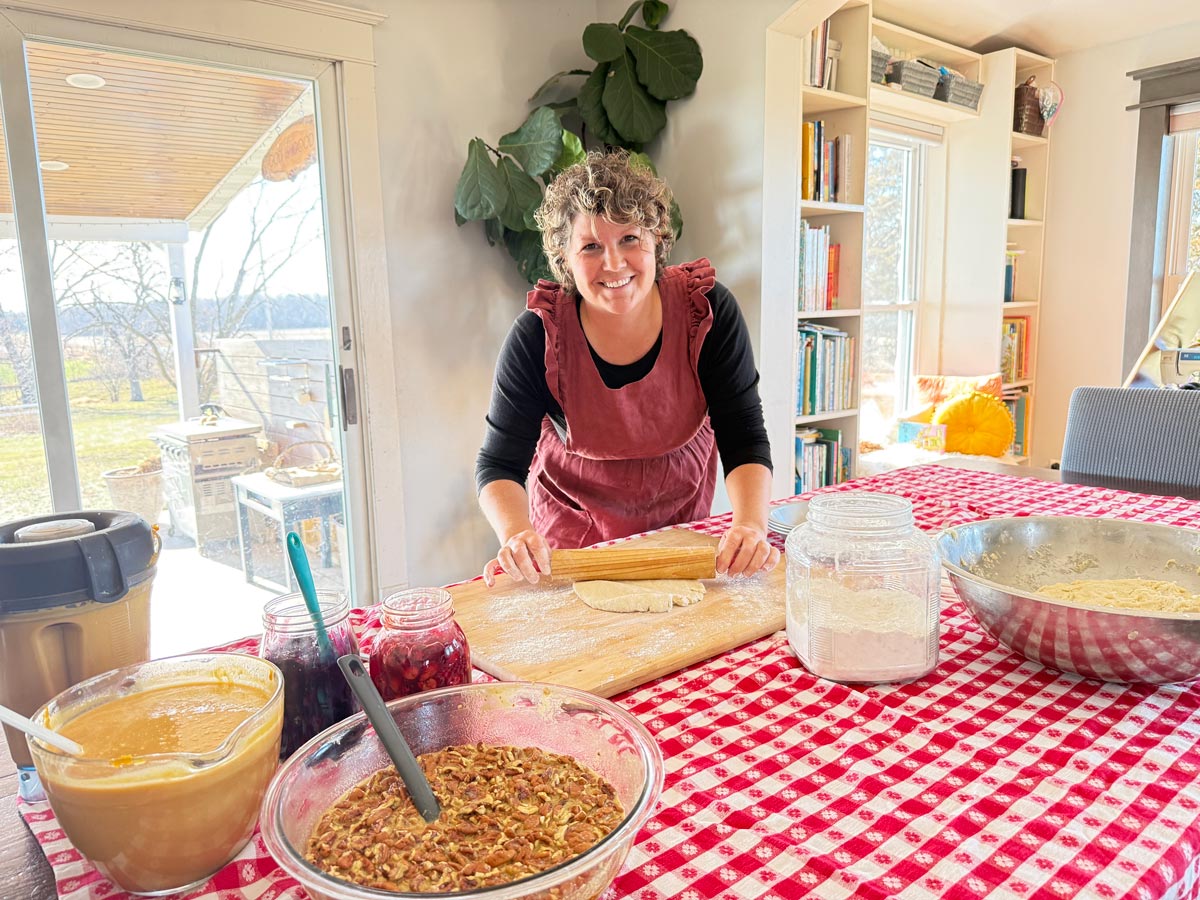
RuthAnn and her family live in Northeast Iowa. She and her husband, Elvin, have been married for 25 years, have 7 children, 2 sons-in-law, and 1 grandson. Five of the children still live at home.
RuthAnn and her husband have been homesteading on their 21-acre homestead since 2001. By involving their children in every aspect of the homestead, they seek to preserve the self-sufficient lifestyle of their Mennonite Heritage for the next generation.
They do it all on their homestead, from raising and harvesting the meat they consume to gardening and preserving those crops to fill the family’s larder. They also process the dairy from the family milk cow and teach many other skills that develop the character, integrity and relationships of a family that desires to bring glory and honor to their Heavenly Father.
Be sure to keep your eye out for RuthAnn’s book, The Heart of the Homestead, releasing September 2025, and her cookbook, expected in 2026! And give her a follow on Instagram or her YouTube channel, Homesteading With the Zimmermans.
Resources
- Episode #53
- Verse of the Week: John 1:5
- Episode #165
- Verse of the Week: Luke 2:52
- Episode #173
- Episode #457
- Episode #465
